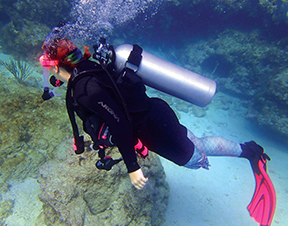By Erin Deegan
Sex. Three little letters arranged in such a way to make most humans blush. Why is something so human so awkward to discuss? As amputees, we have additional challenges and fears involved with this topic that others don’t need to worry about. There are many variables that come into play when deciding to have sex after becoming an amputee and lots of trial and error, but it’s not much different than sex with all of your limbs. Hopefully, this PG-rated article can get that point across.
Intimacy Is Not Just About Sex
To break down the barriers, let’s first take sex out of the equation and focus on intimacy. Sara Hoover, MA, MEd, a sexuality educator and researcher, says, “Partners who are physically intimate can do things to express it other than sex, such as cuddling, holding hands, or giving a back rub.”
The desire for physical touch is referred to as skin hunger. “People who feel they have strong skin hunger may crave physical touch from a loved one, whether it’s sexual or not,” she says. When an individual does not have physical intimacy with another person for an extended period of time, it can affect his or her mood and mental health. Hoover says physical touch and intimacy with a partner affects brain chemistry. “It can result in the release of hormones that boost mood, so it’s not only part of relationship health—it can also influence the individual mental health of each person.
“There are also studies on the importance of immediate physical contact between mothers and newborns,” continues Hoover. “Laying the baby on mother’s chest immediately after birth can boost the baby’s health and help with maternal-infant bonding. So, from the very beginning of our lives, physical touch is an integral part of our overall health.”
Intimacy doesn’t necessarily have to be physical. Simply getting to the level of sharing thoughts and feelings in one-on-one conversation with another person is intimate. You can learn about another person’s feelings, hopes, and fears and share your own. This sharing tends to make people more comfortable and makes it much easier to move to physical intimacy and possibly sex.
Peer Support

As an adult, I’ve spoken candidly with other amputees at conferences and other functions, and I cannot emphasize enough how important peer support is. Speaking openly with other amputees about topics such as intimacy is a great help in removing some of the fear involved with getting back into the playing field. Support groups and counseling can also help. I lost my leg as a teenager, so my first time having sex post-amputation was also my first time ever. To say it was awkward is an understatement. But with time, I became more comfortable in my own skin. This sentiment is echoed by many other amputees, but everyone’s experience is different.
“It was like losing my virginity all over again,” Amber Blount, a dive-shop manager and amputee for six years, says of her first time after amputation. “That super-uncomfortable, you-don’t-know-exactly-what’s-going-to-happen, what-is-the-other-person-thinking-about-you-when-you-take-your-clothes-off feeling. That was the feeling.”
That uncomfortable and awkward feeling can sometimes be alleviated with humor. “I make jokes,” Blount says. “Plus, a few don’t know about my ‘cut here’ tattoo [on my residual limb] so that lightens things up.”

Daniel Edmondson, who has been a bilateral amputee for five years, says, “Physical intimacy isn’t any less exciting or enjoyable as an amputee. Part of it is being comfortable in your own skin and trusting that your partner isn’t bothered by it either. The mechanics of sex might change, but that can be easily adapted if your partner is open.
“You have to accept your new body,” he continues. “You have to do that before anyone else can.” This can be the most challenging hurdle to overcome, as it lies deep within yourself.
Confidence, Trust, and Communication
Being intimate with another person involves confidence, trust, and communication. You have to feel confident in yourself to intimately open up to another individual, whether physically or emotionally. Low self-esteem and poor body image can be a huge concern for amputees.
Confidence is a journey that continues even when you think you have it all figured out. Negative thoughts can be detrimental to your confidence. As difficult as it may seem, the best way to fight negativity is with positivity. If a negative thought enters your mind, cancel it out with a positive thought. Another roadblock to confidence is worrying about others’ opinions. When considering an intimate relationship with someone, this worrying is pretty normal, even for those who aren’t missing limbs. Still, you are likely worrying more than the other person. It’s important to keep in mind that most people do not care that you are an amputee—they care what kind of person you are and how you feel about yourself.
Trust and communication are key components to any intimate relationship. You and your partner must trust each other enough to share this time of your lives together. Being open and honest is a key part of this. You can start by telling your potential partner in the beginning that you are an amputee and that you use a prosthesis. My experience shows that using humor to do this really eases the tension. Sometimes this leads to a question and answer session about your amputation. Be open, be honest. Don’t be put off by questions. It’s normal for non-amputees to be curious about your life as an amputee. Besides, asking questions may show that they want to connect more deeply with you.
“Speaking as a sexual health expert, I think the main thing to focus on is communication,” Hoover says. “It’s not always easy and it definitely takes practice, but being open and honest with a partner about everything from fears to insecurities to even physical sensations and pain can help bridge the gap and lead to greater intimacy and comfort.” She says this communication can help your partner understand what it’s like to have an amputation or limb difference and this can potentially create even more intimacy, trust, and fulfillment for everyone involved. “The more open communication there is, the better.”
Don’t Give Up
As an amputee seeking a relationship, you are likely to find someone who sees you for who you are. Do not give up on finding a partner. As covered earlier, physical touch is important for your mental health. I personally know many amputees who have navigated the dating world and have found themselves in relationships, myself included.
With any relationship, it’s important to also be aware of any warning signs. Taking care of yourself and recognizing when a relationship is not healthy or when it’s abusive is vital.
“If a partner contributes to insecurities or fears, that’s a red flag,” Hoover says. Your partner should accept you and your body the way you are and should not say negative things about you, your body, or your prosthesis. Keep an open mind, try not to worry about things outside of your control (like others’ opinions), and embrace yourself and your body. Try to have a sense of humor about the intricacies of your life as an amputee and be open to questions from those who do not have amputations. And always remember, confidence is sexy.
LET’S GET PHYSICAL
Thinking about re-entering the playing field? Here are some dos and don’ts to keep in mind:
DO be confident.
DO embrace your new body.
DO have a sense of humor.
DON’T worry about others’ opinions.
DON’T be put off by questions.
DO communicate.
DO trust your partner.
DO seek peer support.
DON’T give up.
DO have fun!
TOP IMAGE: pronoia / stock.adobe.com



